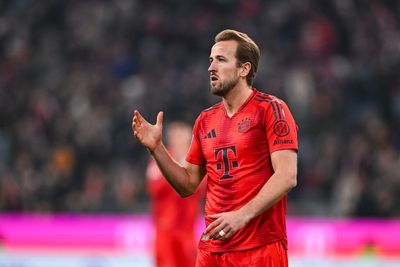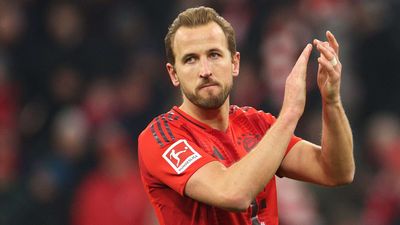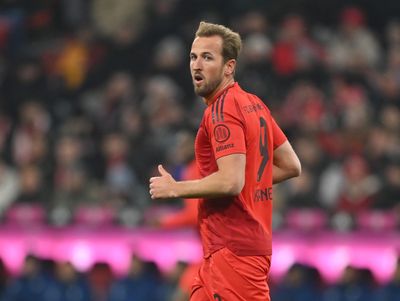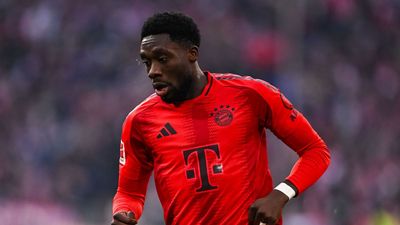Quick Betimate
Popular Leagues
-
UEFA Nations League
-
England (14)
- FA Cup
- Premier League (2)
- Championship (1)
- League 1 (1)
- League 2 (1)
- National League (2)
- National League North
- National League South
- EFL Trophy
- Premier League 2
- Championship Women
- Development League 2 (1)
- FA Cup Women
- FA Trophy
- FA Vase
- Isthmian Division One North
- Isthmian Division One South
- Isthmian Premier Division
- National League Cup
- Northern League Division One
- Northern Premier League
- Reserve Matches
- Southern Premier League Central
- Southern Premier League South
- Super League Women
- U21 Premier League Cup
- Northern Ireland Championship
- Northern Ireland Championship Women (2)
- Northern Ireland Cup
- Northern Ireland Intermediate Cup
- Northern Ireland League Cup Women
- Northern Ireland Play-Offs
- Northern Ireland Premier
- Northern Ireland Premier Intermediate League
- Northern Ireland Premier League Women (4)
- Northern Ireland Reserve League
- Scotland Regional Cup
- Wales League Cup Women
-
Japan J-League Cup (7)
-
UEFA Champions League (1)
-
Spain (89)
- La Liga (10)
- Segunda (11)
- Tercera Group 1 (2)
- Tercera Group 2 (2)
- Tercera Group 3 (2)
- Tercera Group 4 (2)
- Tercera Group 5 (2)
- Tercera Group 6 (2)
- Tercera Group 7 (2)
- Tercera Group 8 (2)
- Tercera Group 9 (2)
- Tercera Group 10 (2)
- Tercera Group 11 (2)
- Tercera Group 12 (2)
- Tercera Group 13 (2)
- Tercera Group 14 (2)
- Tercera Group 15 (2)
- Tercera Group 16 (2)
- Tercera Group 17 (2)
- Tercera Group 18 (2)
- Youth League
- Copa De La Reina (1)
- Copa del Rey
- Kings League - 40 mins play (1)
- Primera Division RFEF Group 1 (10)
- Primera Division RFEF Group 2 (10)
- Primera Federacion Women
- Primera Women
- Queens League - 40 mins play
- Regional Cup
- Regional League
- Regional League Play-Offs
- Segunda Division RFEF Group 1
- Segunda Division RFEF Group 2
- Segunda Division RFEF Group 3
- Segunda Division RFEF Group 4
- Segunda Division RFEF Group 5
- Segunda Division RFEF Play-Offs (10)
- Segunda Federacion Women
- Tercera - Play-Offs
- Tercera Federacion Women
- Women Regional League
- Women Segunda Play-Offs
-
USA (802)
-
UEFA Europa League (1)
-
Germany (83)
- Bundesliga I
- Bundesliga II
- DFB Pokal (1)
- Regionalliga Bayern
- Regionalliga North
- Regionalliga North East
- Regionalliga South West
- Regionalliga West
- Oberliga Baden-Wuerttemberg (9)
- Oberliga Bayern North
- Oberliga Bayern South
- Oberliga Bremen
- Oberliga Hamburg
- Oberliga Hessen (10)
- Oberliga Mittelrhein (8)
- Oberliga Niederrhein (9)
- Oberliga Niedersachsen
- Oberliga NOFV Nord (8)
- Oberliga NOFV Sud (8)
- Oberliga Rheinland-Pfalz/Saar (5)
- Oberliga Schleswig-Holstein
- Oberliga Westfalen (8)
- 3. Liga
- Bundesliga II Play-Offs (2)
- Bundesliga II Women
- Bundesliga Play-Offs (2)
- Bundesliga U19
- Bundesliga Women
- DFB Pokal Women
- Oberliga Play-Offs (6)
- Regionalliga Play-Offs (6)
- U19 Cup (1)
-
Italy (20)
- Serie A (10)
- Serie B (2)
- Serie C Group A
- Serie C Group B
- Serie C Group C
- Campionato Nazionale
- Campionato Primavera 1
- Campionato Primavera 2
- Serie D
- Coppa Italia
- Coppa Italia Women
- Campionato Primavera 3
- Campionato Primavera 4
- Serie A Women
- Serie B Play-Offs (2)
- Serie B Women
- Serie C Play-Offs (4)
- Serie C Super Cup
- Serie D Play-Offs (2)
- U19 League Women
-
France (6)
-
Netherlands (19)
-
Scotland (3)
-
Japan J-League (2)
-
Lebanon League (1)
-
Indonesia Liga 1 (9)
-
Greece Super League 1 (3)
-
Georgia Erovnuli Liga (5)
-
South Korea K League 1 (6)
-
UAE Premier League (4)
-
Esport (176)
Other Leagues
-
Albania
-
Algeria (3)
-
Andorra (1)
-
Angola (8)
-
Argentina (86)
- Nacional B (19)
- Primera B Metropolitana (5)
- Primera C Metropolitana (12)
- Reserve League (1)
- Cup (11)
- Torneo A (18)
- Copa Santa Fe
- Championship Women (2)
- Copa de la Liga Profesional
- Copa Santa Fe Women
- Copa Santa Fe Women - 80 mins play
- Liga Profesional (1)
- Liga Profesional Reserves (15)
- Nacional Reserve League (2)
- Regional League
- Youth League
-
Armenia (9)
-
Aruba (1)
-
Australia (128)
- A-League (2)
- A-League Women
- Capital Territory NPL2 (4)
- Capital Territory NPL2 U23 League
- Capital Territory Premier League (4)
- Capital Territory Premier League Women
- Capital Territory Premier League Women Reserves
- Capital Territory U23 League
- Cup
- Cup Qualifying (8)
- Darwin Premier League
- FFA Cup Qualifying
- New South Wales League 1 (8)
- New South Wales League 2
- New South Wales NPL Women (7)
- New South Wales NPL2 Women
- New South Wales Premier League (8)
- New South Wales U20 League (1)
- Northern NSW Division 1 (1)
- Northern NSW Premier League (2)
- Northern NSW Premier League Women
- Northern NSW Reserves League (1)
- NPL Queensland (6)
- NPL Queensland U23 (1)
- NPL Queensland Women (5)
- NPL Victoria (7)
- NPL Victoria U23
- NPL Victoria Women (6)
- NSW League 1 U20
- NSW League 2 U20
- Queensland PL 2 U23
- Queensland PL U23
- Queensland Premier League (6)
- Queensland Premier League 2 (6)
- Queensland Premier League 2 Women
- Queensland Premier League 3
- Queensland Premier League 4
- Queensland Premier League Women
- SA Premier League Reserves
- SA Premier League Women (5)
- SA Premier League Women Reserves
- South Australia Premier League (6)
- South Australia State League 1 (6)
- South Australia State League Reserves
- Sunday League Premier Division
- Sunday League Premier Division Reserve
- Tasmania Championship (4)
- Tasmania Championship 1
- Tasmania Championship Women
- Tasmania NPL U21 League
- Tasmania Premier League (4)
- Tasmania South Division 1
- Tasmania Super League Women
- Victoria PL 1 U23
- Victoria Premier League 1 (4)
- Victoria Premier League 2 (3)
- Victoria Premier League Women
- Victoria State League 1
- Victoria State League 1 Reserves
- Victoria State League 2
- Victoria State League 2 Reserves
- WA Premier League Women (1)
- WA Premier League Women U21
- WA State Cup Women
- WA State League 1 Reserves
- Western Australia Premier League (6)
- Western Australia State League 1 (6)
- Western Australia State League 1 Women
- Western Australia State League 2
- Western Australia U23 League
- Australian Matches
-
Austria (39)
-
Azerbaijan (11)
-
Bahrain (6)
-
Bangladesh (2)
-
Barbados
-
Belarus (19)
-
Belgium (1)
-
Benin
-
Bhutan
-
Bolivia (16)
-
Bosnia & Herzegovina (14)
-
Botswana (8)
-
Brazil (183)
- Serie A (11)
- Serie B (10)
- Serie C (10)
- Campeonato Amapaense
- Campeonato Baiano 2 (5)
- Campeonato Brasileiro A2 Women (8)
- Campeonato Brasileiro Serie B U20 (4)
- Campeonato Carioca A2 (1)
- Campeonato Carioca B (5)
- Campeonato Gaucho 2 (7)
- Campeonato Goiano 2 (4)
- Campeonato Maranhense
- Campeonato Mineiro 2 (6)
- Campeonato Mineiro U20 (6)
- Campeonato Paranaense 2 (5)
- Campeonato Paulista A4
- Campeonato Paulista U20 (24)
- Catarinense 2 (4)
- Copa Espirito Santo (7)
- Copa Nordeste (4)
- Copa Rio Women
- Copa Verde
- Matches
- Matches Women
- Paraense
- Paulista Cup (11)
- Paulista Serie B
- Paulista Women (4)
- Serie A U20 (10)
- Serie A1 Women (8)
- Serie A2 Women
- Serie A3 Women (8)
- Serie D (3)
- U20 Cup
- U20 League (2)
- U20 Women Cup
- Copa do Brasil (16)
- Women’s Friendly
-
Bulgaria (18)
-
Burkina Faso
-
Burundi
-
Cambodia
-
Cameroon (2)
-
Canada (8)
-
Chile (23)
-
China (46)
-
Colombia (12)
-
Costa Rica (2)
-
Côte d’Ivoire
-
Croatia (23)
-
Cuba
-
Cyprus
-
Czech Republic (90)
-
Denmark (56)
-
Djibouti
-
Dominica
-
Dominican Republic
-
Ecuador (19)
-
Egypt (23)
-
El Salvador (2)
-
Estonia (21)
-
Ethiopia (9)
-
Faroe Islands (14)
-
Fiji
-
Finland (105)
-
Gambia (6)
-
Georgia (10)
-
Ghana (9)
-
Gibraltar
-
Greece (3)
-
Guatemala
-
Haiti (8)
-
Honduras (1)
-
Hong Kong SAR China (6)
-
Hungary (15)
-
Iceland (48)
-
India
-
Indonesia (9)
-
Iran (2)
-
Iraq (10)
-
Ireland (19)
- Republic of Ireland FAI Cup
- Republic of Ireland FAI Intermediate Cup
- Republic of Ireland First Division (5)
- Republic of Ireland Leinster Senior Cup
- Republic of Ireland Leinster Senior League (3)
- Republic of Ireland Munster Senior Cup
- Republic of Ireland Munster Senior League
- Republic of Ireland National League Women (6)
- Republic of Ireland Premier Division (5)
- Republic of Ireland U20 League
-
Israel (9)
-
Jamaica (1)
-
Japan (67)
-
Jordan
-
Kazakhstan (14)
-
Kenya (10)
-
Kuwait (2)
-
Kyrgyzstan
-
Latvia (17)
-
Lebanon (1)
-
Liechtenstein (1)
-
Lithuania (22)
-
Luxembourg (17)
-
Macau SAR China
-
Macedonia (1)
-
Malawi (9)
-
Malaysia (2)
-
Mali
-
Malta
-
Mauritania
-
Mexico (2)
-
Moldova (3)
-
Mongolia
-
Montenegro (10)
-
Morocco (1)
-
Mozambique (1)
-
Myanmar (Burma) (1)
-
Namibia
-
Nepal
-
New Zealand (16)
-
Nicaragua (1)
-
Niger
-
Nigeria (10)
-
Norway (99)
- Eliteserien (8)
- Division 1 (8)
- Cup (8)
- Cup Women (8)
- Division 1 Play-Offs
- Division 1 Women (6)
- Division 2 Group 1 (7)
- Division 2 Group 2 (7)
- Division 2 Group 3
- Division 3 Group 1 (7)
- Division 3 Group 2 (7)
- Division 3 Group 3 (7)
- Division 3 Group 4 (7)
- Division 3 Group 5 (7)
- Division 3 Group 6 (7)
- Interkretsserie U19
- Toppserien Women (5)
- U19 Elite League
- Youth Cup
-
Oman
-
Panama (4)
-
Paraguay (16)
-
Peru (18)
-
Philippines
-
Poland (77)
-
Portugal (12)
-
Puerto Rico
-
Qatar
-
Romania (28)
-
Russia (32)
-
Rwanda (10)
-
Saint Kitts and Nevis
-
San Marino (1)
-
Saudi Arabia (13)
-
Senegal (6)
-
Serbia (17)
-
Seychelles
-
Sierra Leone
-
Singapore (7)
-
Slovakia (23)
-
Slovenia (13)
-
Solomon Islands
-
South Africa (1)
-
South Korea (24)
-
Suriname
-
Sweden (109)
- Europe Friendlies (1)
- Allsvenskan Qualification
- Superettan Qualification
- 1.div Norra (8)
- Cup (1)
- 1.div Södra (8)
- 2.div Norra Götaland (7)
- 2.div Norra Svealand (7)
- 2.div Norrland (16)
- 2.div Södra Götaland (7)
- 2.div Södra Svealand (7)
- 2.div Västra Götaland (7)
- Allsvenskan (2)
- Cup Qualification (6)
- Cup Women (1)
- Damallsvenskan (1)
- Div 1 Relegation (8)
- Elitettan (7)
- Juniorallsvenskan (7)
- Superettan (8)
-
Switzerland (23)
-
Taiwan
-
Tajikistan
-
Tanzania (16)
-
Thailand (2)
-
Togo
-
Trinidad and Tobago (6)
-
Tunisia (16)
-
Turkey (23)
-
Uganda (2)
-
Ukraine (20)
-
United Arab Emirates (18)
-
Uruguay (6)
-
Uzbekistan (14)
-
Venezuela (4)
-
Vietnam (20)
-
Wales
-
Zambia
-
Zimbabwe
Julian Nagelsmann: The Young Mastermind of Football Management

Julian Nagelsmann is a name that has been making headlines in the football world for his brilliant tactics and management skills. He is considered one of the most promising young managers in the world, and his recent appointment as the manager of FC Bayern Munich has cemented his position as a prodigy in football management. In this article, we will delve into the life and career of Julian Nagelsmann and explore his journey to becoming the young mastermind of football management.
All You Need to Know About Julian Nagelsmann Biography
On June 21, 2018, Hoffenheim announced that Nagelsmann would leave the club after the 2018/19 season. On the same day, RB Leipzig announced that Nagelsmann would become the team's new coach in the summer of 2019. He will be in charge of FC Bayern Munich from the 2021/2022 season.
Julian Nagelsmann Information
Now that we know him better in this section of Julian Nagelsmann's Biography we share some general information about him such as Julian Nagelsmann's nationality so that you can get to know him better.
Julian Nagelsmann Bio
| Full Name | Julian Nagelsmann |
| Nickname | Mini-Mourinho |
| Profession | Professional Footballer |
Julian Nagelsmann Physical Stats
| Weight | 84 Kg |
| Height | 1.90 m |
| Eye Color | Blue |
| Hair Color | Brown |
Julian Nagelsmann Football Information
| Position | Centre Back |
| Jersey Number | N/A |
| Professional Debut | 2006 |
Julian Nagelsmann Date of Birth and Personal Info
| Date of Birth | 23 July 1987 |
| Birth Place | Landsberg am Lech, West Germany |
| Zodiac Sign | Cancer |
| Nationality | German |
Julian Nagelsmann's Early Life and Career
Before becoming a successful coach, Nagelsmann was a promising player with dreams of making it to the top. In this article, we will take a closer look at Nagelsmann's early life and playing career, exploring the challenges he faced and the determination that propelled him toward his current success.
Early Life
Julian Nagelsmann was born on July 23, 1987, in Landsberg am Lech, a small town in Bavaria, Germany. From a young age, he showed a keen interest in football and began playing for the local club, TSV 1860 Landsberg. Nagelsmann's father, Erwin Nagelsmann, was also a football coach, and he played a pivotal role in his son's early development. Erwin taught Julian the fundamentals of the game and instilled in him a strong work ethic and a never-give-up attitude.
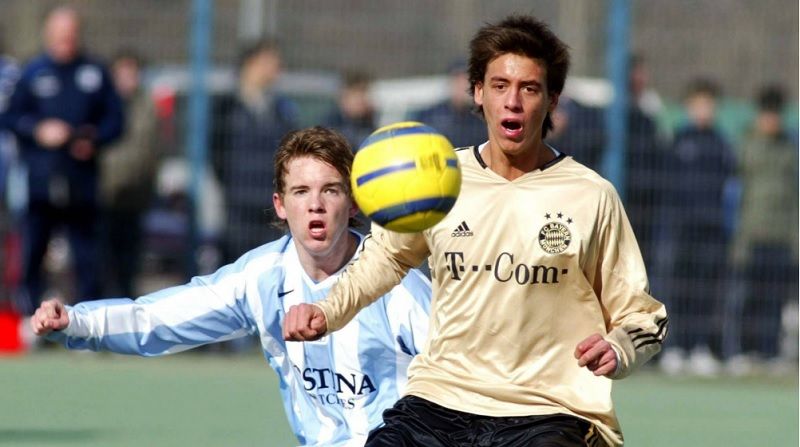
Julian Nagelsmann's Early Life and Career
Despite his early passion for football, Nagelsmann faced a significant setback when he was just 16 years old. He was diagnosed with a knee injury that required surgery and was told that he would never be able to play at a high level again. This was a devastating blow for Nagelsmann, who had dreamed of playing professionally. However, instead of giving up on his dream, he decided to channel his energy into coaching.
Playing Career
Nagelsmann began his coaching career at a young age, taking charge of his brother's youth team while he was still recovering from his injury. He quickly discovered that he had a talent for coaching and decided to pursue it as a career. However, he didn't give up on his playing career entirely. Nagelsmann returned to the field and played for several amateur clubs, including FC Augsburg II and 1860 Munich II.
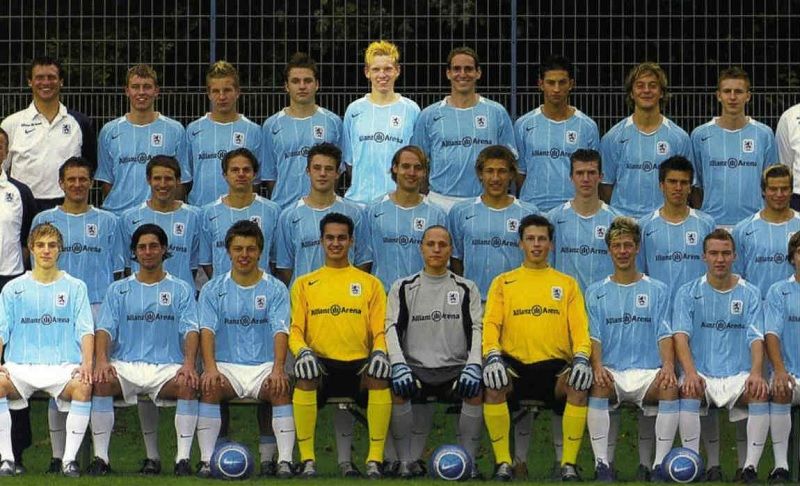
Nagelsmann faced a significant setback when he was just 16 years old
Nagelsmann's playing career was not without its challenges. He faced stiff competition for a place in the starting lineup and struggled with injuries throughout his career. However, his persistence and determination helped him to overcome these obstacles, and he continued to play at a high level until he retired in 2008 at the age of just 21.
Coaching Career
After the end of his playing career, Nagelsmann became Thomas Tuchel's assistant coach, with whom he scouted until the end of his current contract with the second team of the Augsburg opponents. This job gave Nagelsmann the idea of pursuing a coaching career. Later he worked with his former coach Alexander Schmidt as an assistant coach for the U17 team of his former club TSV 1860 Munich.
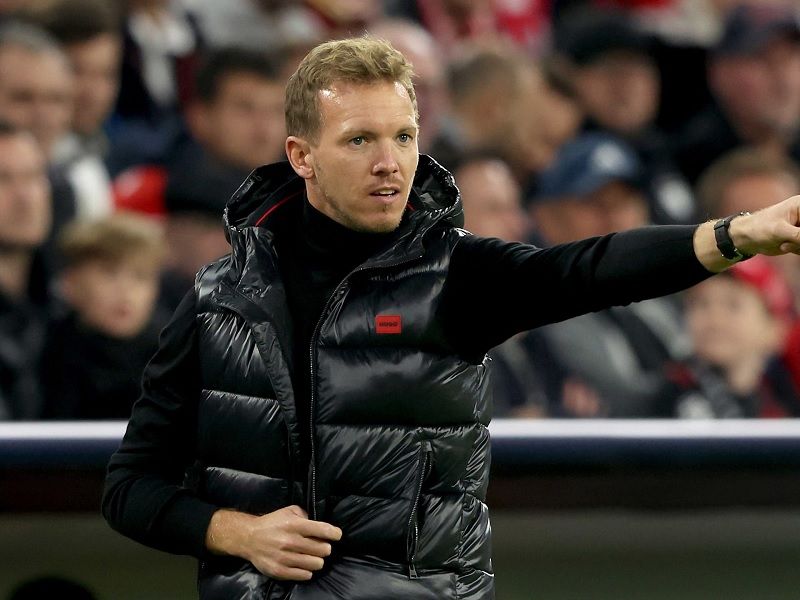
Nagelsmann took over the position of head coach of the club's A-Juniors
In the 2010/11 season, Nagelsmann took on coaching tasks in the youth division of TSG 1899 Hoffenheim for the first time. In December 2012, he was appointed assistant coach of the first team under interim coach Frank Kramer and later supported Kramer's successor Marco. Kurz and Markus Gisdol in the relegation games to ensure relegation.
Nagelsmann took over the position of head coach of the club's A-Juniors (U19) team for the 2013/14 season. At the age of 26, he became the youngest coach in the U19 league with them. The Hoffenheim U19s finished second in Germany in the 2014/15 season. At the same time, Nagelsmann completed his training as a football coach at the Hennes-Weisweiler Academy in Hennef.
Head coach of TSG 1899 Hoffenheim
TSG 1899 Hoffenheim announced at the end of October 2015 that Nagelsmann would take over the first team from the 2016/17 season after completing his formation, regardless of his subsequent league affiliation, and would replace Huub Stevens, who was presented on the same day, in table 17. Saving Bundesliga teams from relegation.
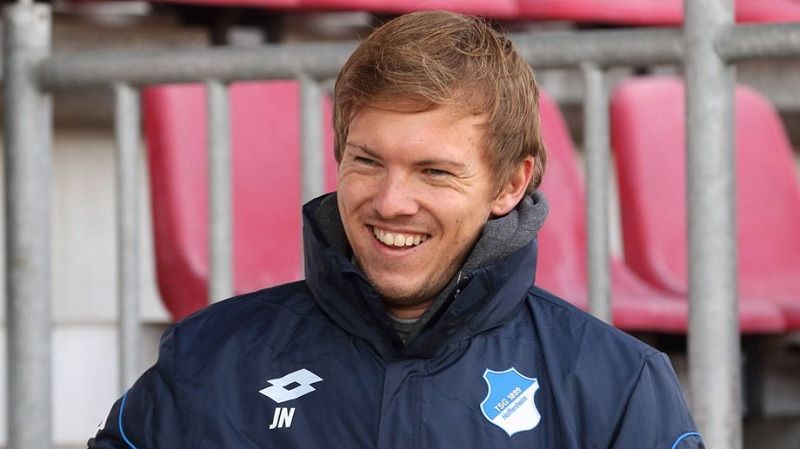
Head coach of TSG 1899 Hoffenheim
RB Leipzig
In June 2018, RB Leipzig appointed Nagelsmann as the new head coach for the 2019/20 season and received a contract until June 30, 2023. The team played their first game with the new manager on August 11, 2019. a narrow 2:3 win against VfL Osnabrück in the first round of the DFB Cup.
A week later, Nagelsmann won his Bundesliga debut with his new team 4-0 against 1. FC Union Berlin. After two more wins in the next Bundesliga games this season against Eintracht Frankfurt and Borussia Mönchengladbach, they played at home against FC Bayern Munich on September 14, 2019, with a 1-1 draw.
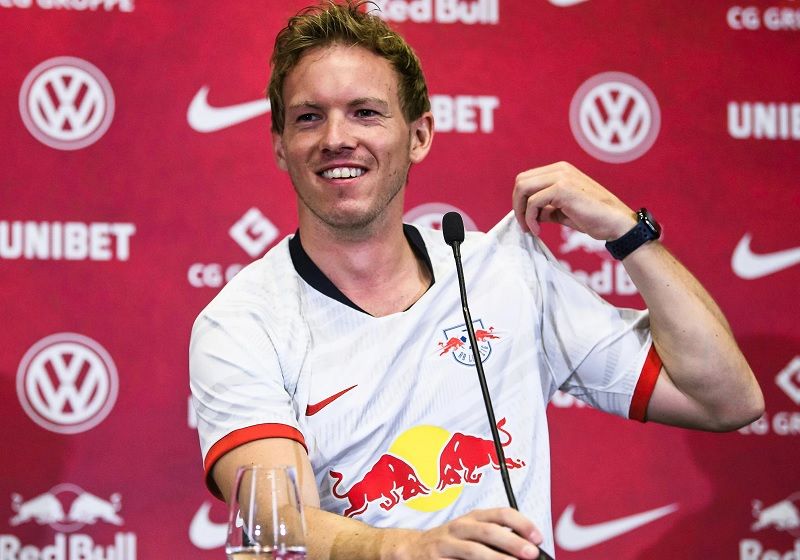
RB Leipzig appointed Nagelsmann as the new head coach for the 2019/20 season
In this season's Champions League, RB Leipzig was drawn in Group G along with Zenit Saint Petersburg, Benfica Lisbon and Olympique de Lyon. After 3 wins, 2 draws and one loss against Lyon, they finished first in their group and advanced to the KO rounds.
Bayern Munich
Julian Nagelsmann will take over from the German record champions FC Bayern Munich for the 2021/22 season. The official announcement was made on April 27, 2021. The 33-year-old Nagelsmann replaces Hansi Flick, who led Bayern to the treble last season.
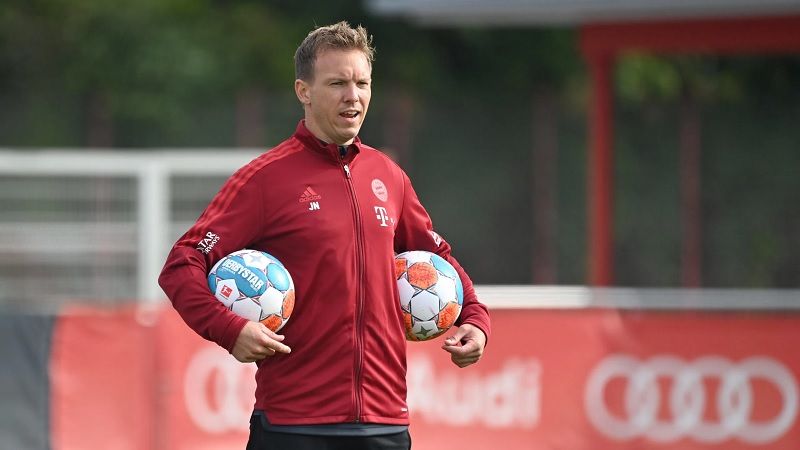
Julian Nagelsmann took over from the German record champions FC Bayern Munich
Julian Nagelsmann's Tactical Philosophy
Julian Nagelsmann has become a household name in the world of football due to his remarkable tactical abilities. At just 34 years old, he has already made a name for himself as one of the brightest young coaches in the game. Nagelsmann's tactical philosophy is characterized by a unique blend of attacking flair and defensive solidity. He has built his teams around a cohesive style of play that emphasizes possession, pressing, and positional interchangeability.
The Nagelsmann Approach to Football
At the heart of Nagelsmann's approach to football is a commitment to proactive, attacking football. His teams play with a high level of intensity, pressing opponents high up the pitch and looking to create chances through quick, incisive passing. Nagelsmann's teams are characterized by their fluidity, with players regularly swapping positions and interchanging roles. This allows them to create overloads in key areas of the pitch and to create chances from a variety of different angles.
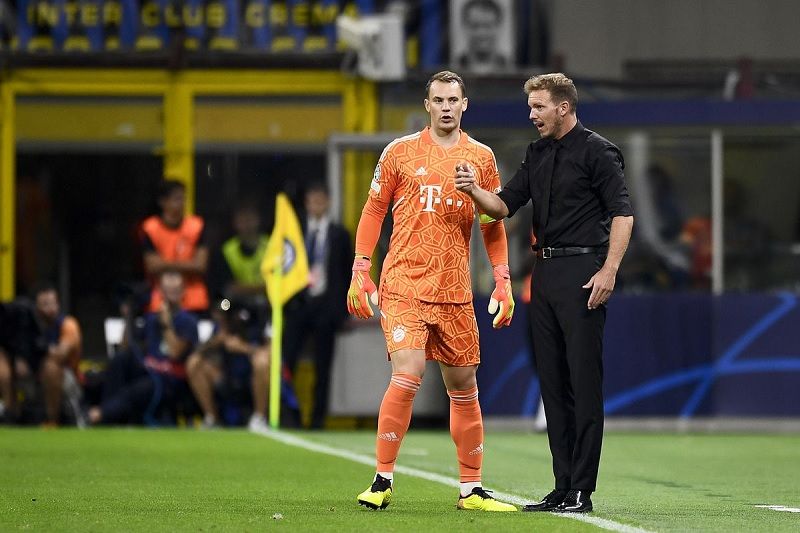
The Nagelsmann Approach to Football
The Importance of Possession
One of the key components of Nagelsmann's tactics is possession. His teams prioritize keeping the ball and circulating it quickly, using possession as a means of controlling the game and limiting the opposition's opportunities. This approach requires a high level of technical proficiency from his players, as well as a willingness to take risks and play with confidence. Nagelsmann's teams are always looking to move the ball forward and create opportunities for their forwards, rather than simply holding onto the ball for the sake of it.
Pressing and Transition Play
Another key aspect of Nagelsmann's tactics is pressing. His teams are renowned for their high-energy pressing style, which is designed to disrupt the opposition's build-up play and force turnovers. Nagelsmann's teams are particularly effective at pressing high up the pitch, often using a high defensive line to limit the amount of space available to the opposition. This approach requires a high level of fitness and tactical awareness from his players, as well as a willingness to work hard off the ball.
Key aspect of Nagelsmann's tactics is pressing
In addition to pressing, Nagelsmann's teams are also adept at transition play. They are able to quickly transition from defense to attack, using quick passing and movement to catch the opposition off guard. This approach requires a high level of tactical intelligence from his players, as well as an ability to read the game and anticipate opportunities.
Julian Nagelsmann's tactical philosophy is a masterclass in modern football. His commitment to proactive, attacking football has made him one of the most exciting young coaches in the game, and his teams are always a joy to watch. By prioritizing possession, pressing, and transition play, Nagelsmann has developed a unique style of play that is both effective and entertaining. As he continues to grow and develop as a coach, it will be fascinating to see how his tactics evolve and how they influence the wider game. If you want to see the future of football, look no further than Julian Nagelsmann's tactics.
Player Development
Nagelsmann's coaching philosophy is based on a few key principles, including tactical flexibility, high-intensity pressing, and individual player development. He believes that every player has unique strengths and weaknesses and that it's his job as a coach to develop those strengths and minimize those weaknesses to create a well-rounded team.
To achieve this, Nagelsmann places a great emphasis on individual player development. He creates personalized training programs for each player, focusing on their specific needs and weaknesses. He also spends a lot of time analyzing each player's performance and giving them detailed feedback on how they can improve.
Tactical Flexibility
Nagelsmann is known for his tactical flexibility, and he believes that this is key to success in modern football. He is not wedded to one particular formation or playing style but instead adapts his tactics to suit the strengths and weaknesses of his team and the opposition.
This was evident during his time at RB Leipzig, where he used a variety of formations, including a 3-4-3, 4-2-2-2, and a 4-4-2 diamond. This flexibility allowed him to create a dynamic and unpredictable team that was difficult to play against.
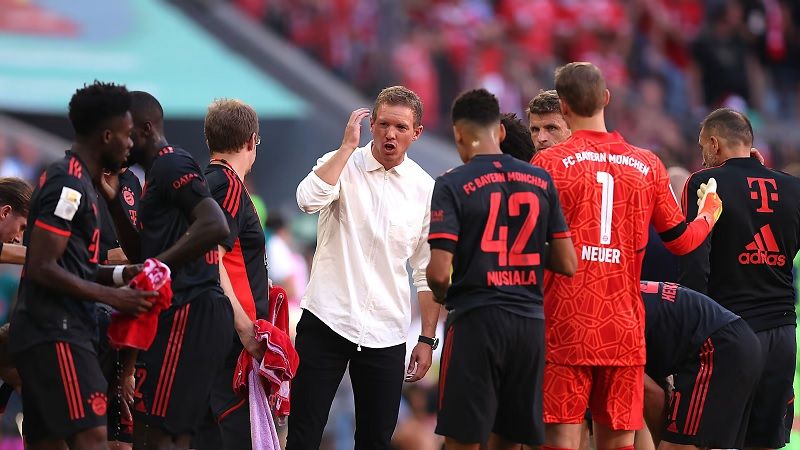
Nagelsmann is known for his tactical flexibility
Another hallmark of Nagelsmann's approach is high-intensity pressing. His teams are known for their aggressive pressing, which aims to win the ball back quickly and create scoring opportunities. This style of play requires a high level of fitness, and Nagelsmann places a lot of emphasis on physical training and conditioning.
During his time at Hoffenheim, Nagelsmann's team set a new Bundesliga record for the most high-intensity sprints in a single game, with 307 sprints against RB Leipzig. This shows just how effective his high-intensity pressing style can be.
Player Development
Finally, Nagelsmann's approach to player development is a key part of his success. He believes that every player has the potential to improve, regardless of their age or experience. He works closely with his players to identify their strengths and weaknesses and create personalized training programs that help them reach their full potential.
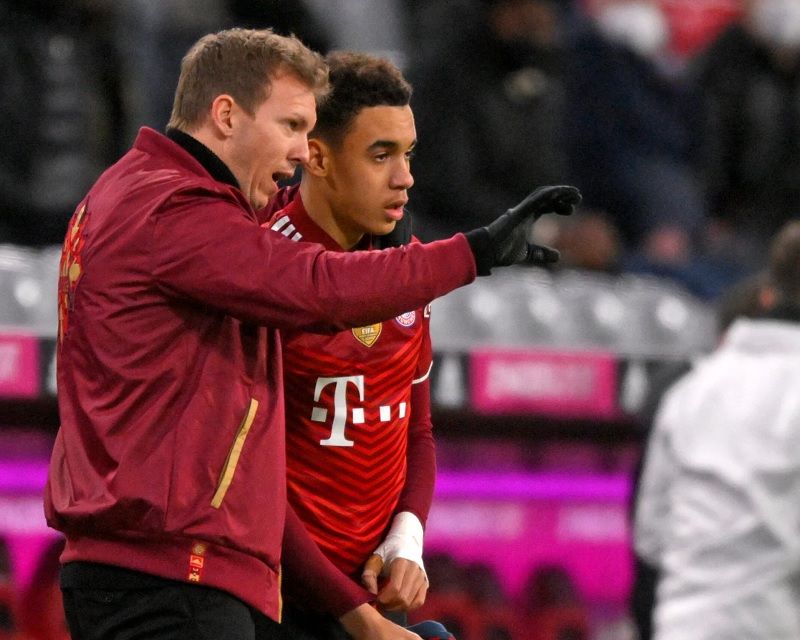
Nagelsmann's approach to player development is a key part of his success
This approach has helped Nagelsmann develop a number of world-class players, including Timo Werner, Dayot Upamecano, and Amadou Haidara. All of these players have gone on to achieve great success at both club and international levels, thanks in part to Nagelsmann's guidance.
Julian Nagelsmann's innovative approach to player development has helped him become one of the most sought-after coaches in world football. His emphasis on individual player development, tactical flexibility, and high-intensity pressing has proven to be highly effective and has helped him achieve success with various clubs in Germany. As he takes on new challenges at Bayern Munich, it will be interesting to see how his approach evolves and how it helps shape the future of football.
Nagelsmann's Leadership and Communication
Nagelsmann's leadership style and communication skills have been key factors in his success. He has been able to instill a sense of belief and confidence in his players, which has resulted in some outstanding performances on the pitch. In this article, we will take a closer look at Nagelsmann's leadership and communication skills and examine how he has been able to achieve such remarkable success.
Nagelsmann's Leadership Style
Nagelsmann's leadership style is one that is built on trust, communication, and empowerment. He has a clear vision of how he wants his teams to play and is able to articulate this vision in a way that inspires his players to buy into his ideas.
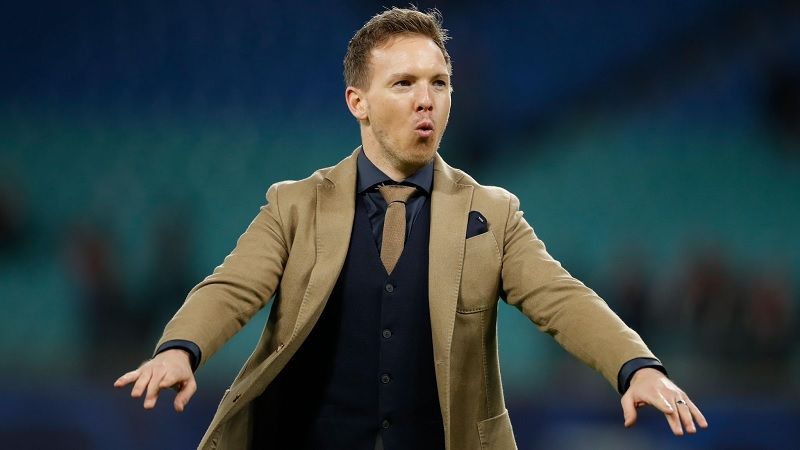
Nagelsmann's leadership style is one that is built on trust
One of the key aspects of Nagelsmann's leadership style is his ability to create a positive team culture. He places a great emphasis on team bonding and has been known to organize team-building exercises and outings. By creating a sense of unity and togetherness within his squad, Nagelsmann has been able to foster a positive team spirit that has translated into success on the pitch.
Nagelsmann also places a great deal of trust in his players, empowering them to take ownership of their roles on the pitch. This trust has been repaid with some outstanding performances from his players, who have been able to express themselves freely on the pitch without fear of making mistakes.
Nagelsmann's Communication Skills
Effective communication is a vital component of any successful team, and Nagelsmann is a master at it. He has the ability to communicate his ideas clearly and concisely, making it easy for his players to understand what is expected of them.
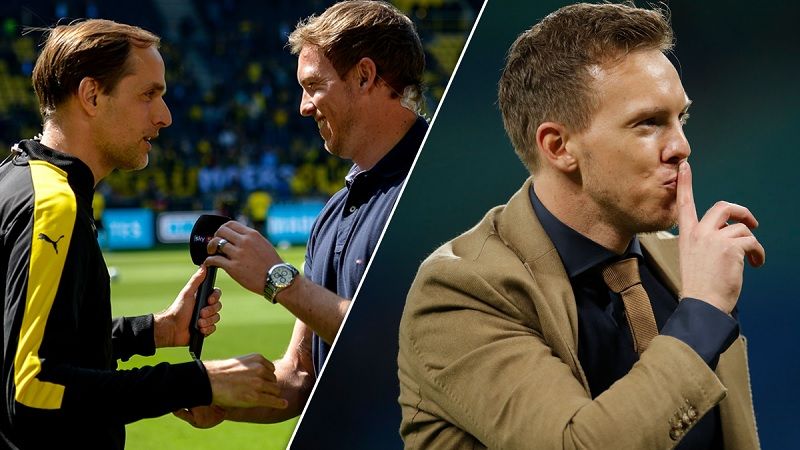
Nagelsmann's Communication Skills
Nagelsmann is also an excellent listener. He takes the time to understand his players' concerns and ideas, creating an environment where his players feel valued and listened to. By listening to his players, Nagelsmann has been able to create a culture of openness and honesty, where players feel comfortable expressing their opinions and ideas.
Another aspect of Nagelsmann's communication skills is his ability to provide constructive feedback. He is able to identify areas where his players can improve and provide them with specific feedback on how to do so. This feedback is always delivered in a positive and encouraging manner, which has helped to motivate his players to work harder and improve their performances.
Major Achievements
Julian Nagelsmann's rise to fame has been nothing short of remarkable. At just 33 years old, he has already achieved more than many football managers do in their entire careers. From his humble beginnings as a football player to his current position as the head coach of Bayern Munich, Nagelsmann has proven time and time again that he is a force to be reckoned with. In this article, we will take a closer look at Nagelsmann's major achievements and the impact he has had on the sport of football.
Nagelsmann's Achievements with Bayern Munich
Nagelsmann's appointment as the head coach of Bayern Munich in 2021 was a major milestone in his career. Since taking on this role, he has led the team to numerous victories and achievements. In his first season with the club, he led them to the Bundesliga title and the DFL Supercup. He also guided them to the UEFA Champions League quarterfinals, where they were unfortunately knocked out by Paris Saint-Germain. Despite this setback, Nagelsmann's strategic approach to the game and his ability to motivate his players have earned him widespread praise and admiration.
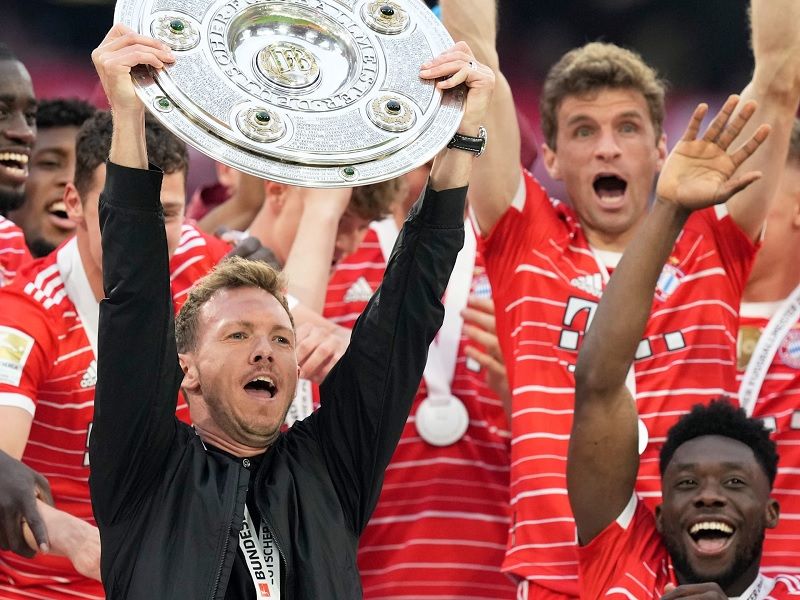
Nagelsmann's Achievements with Bayern Munich
Nagelsmann's Achievements with Hoffenheim
Before his tenure at Bayern Munich, Nagelsmann spent several years as the head coach of Hoffenheim. During his time with the club, he achieved some incredible feats, including leading them to their best-ever finish in the Bundesliga. In the 2017-2018 season, he guided them to a third-place finish and secured their place in the UEFA Champions League for the first time in the club's history. This remarkable achievement earned him the title of "Manager of the Year" in Germany. Nagelsmann's innovative tactics and ability to develop young talent have made him a highly sought-after coach in the world of football.
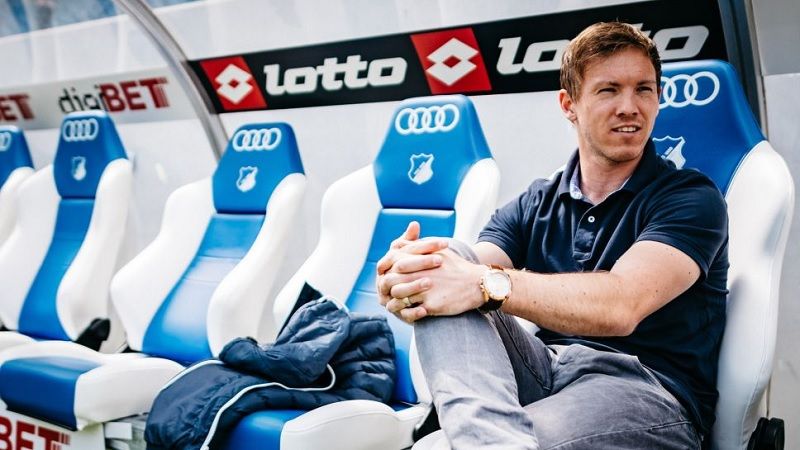
Nagelsmann's Achievements with Hoffenheim
Nagelsmann's Personal Achievements
Apart from his achievements as a coach, Nagelsmann has also achieved a number of personal milestones throughout his career. He was a former football player who played for 1860 Munich's youth sides. At the age of just 28, he became the youngest-ever German top-flight manager when he took over as head coach of Hoffenheim. In addition, Nagelsmann is known for his social media abstinence, as he does not have a presence on any social media platforms.
Criticisms and Challenges
Julian Nagelsmann is considered one of the brightest young coaches in world football. After a successful spell at RB Leipzig, he was appointed as the head coach of Bayern Munich in 2021. Despite his impressive credentials, Nagelsmann has faced several criticisms and challenges during his short time at the club.
Tactical Training Sessions
One of the criticisms leveled at Nagelsmann has been the complexity of his tactical training sessions. There have been suggestions that his exercises are too challenging and that there hasn't been enough time for the players to absorb the information. This has led to concerns that his methods may be too sophisticated for some of the players, especially the older ones. Nagelsmann will need to find a way to simplify his training sessions while still maintaining their effectiveness.
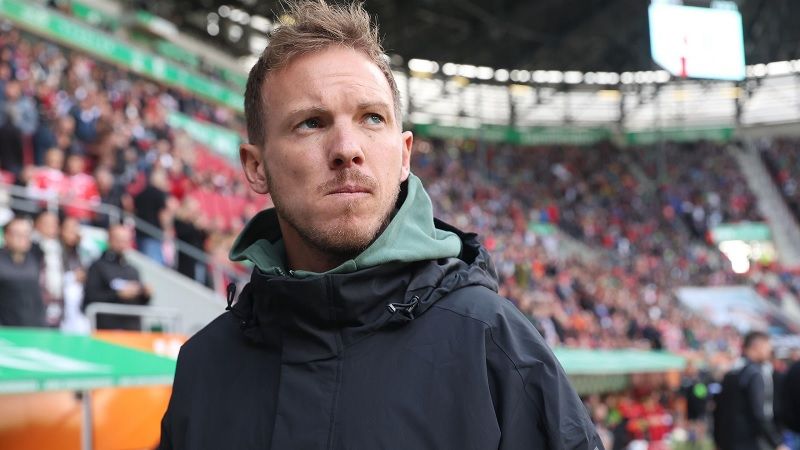
One of the criticisms leveled at Nagelsmann has been the complexity of his tactical training sessions
Too Many Mistakes
Nagelsmann has also faced criticism for his team's tendency to make mistakes. He himself has criticized the team for making too many errors, especially during the first leg of their Champions League tie against RB Salzburg. This is a problem that has plagued Bayern Munich in recent years, and Nagelsmann will need to find a way to address it if he is to succeed at the club.
Domestic League is Not a Challenge
Another challenge that Nagelsmann faces is the lack of competition in the German domestic league. Bayern Munich has dominated the Bundesliga for several years, winning the title for nine consecutive seasons. This has led to criticism that the league is not a challenge for the team, and that it is difficult for Nagelsmann to assess the true quality of his players. This is a problem that is faced by many coaches of elite clubs, such as Juventus and Paris Saint-Germain.
Impact on the Future of Football
Nagelsmann's Innovative Tactics and Strategies
Nagelsmann's tactical approach to the game has been one of his defining characteristics. He is known for his use of the "high pressing" system, which involves putting intense pressure on the opposition when they have the ball. This strategy has proven to be very effective, and it has helped Nagelsmann's teams to dominate games.
Nagelsmann's Innovative Tactics and Strategies
Another tactic that Nagelsmann has employed is the use of wing-backs. This strategy involves playing with three central defenders and two wing-backs who are responsible for providing width in attack. This approach has been successful for Nagelsmann, and it has allowed his teams to create more scoring opportunities.
Developing Young Talent
One of Nagelsmann's greatest strengths as a coach is his ability to develop young talent. He has a keen eye for identifying promising players, and he has a track record of nurturing them into world-class talents. Nagelsmann has shown that he is not afraid to give young players a chance to shine, and this has paid off in a big way.
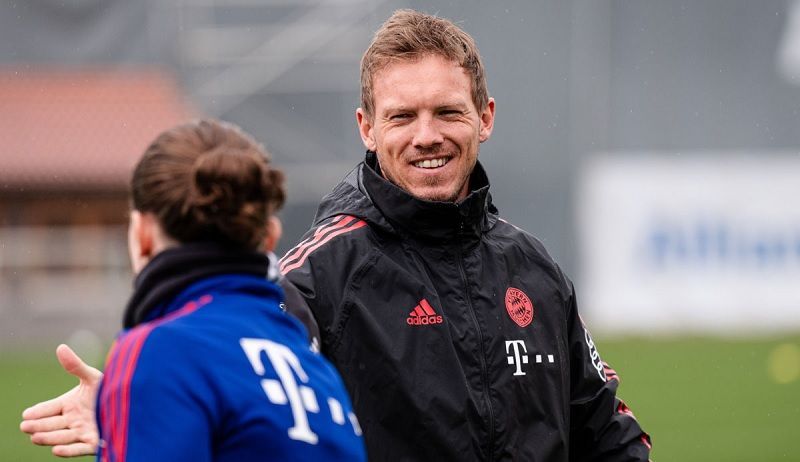
One of Nagelsmann's greatest strengths as a coach is his ability to develop young talent
For example, during his time at RB Leipzig, Nagelsmann helped to develop several young players, including Dayot Upamecano, Christopher Nkunku, and Dani Olmo. These players have since become some of the most highly sought-after talents in Europe, and Nagelsmann played a significant role in their development.
Julian Nagelsmann is a coach who is changing the face of football. His innovative tactics and his ability to develop young talent have made him one of the most sought-after coaches in Europe. Nagelsmann's impact on the future of football is undeniable, and his success as a coach is a testament to his hard work and dedication to the sport. It will be interesting to see how Nagelsmann continues to evolve as a coach and how his strategies and tactics will shape the future of football.
Personal Life and Interests
Nagelsmann's Personal Life
Despite his success on the football pitch, Nagelsmann's personal life has remained relatively private. He is married to Verena Nagelsmann and the couple has two children together, a son and a daughter.

In interviews, Nagelsmann has spoken about the importance of his family in his life, saying that they keep him grounded and help him maintain a work-life balance. He also enjoys spending his free time with his family and has been known to take them on vacations during the football season.
Nagelsmann's Interests Outside of Football
While football is undoubtedly Nagelsmann's primary passion, he also has a variety of interests outside of the game. He is an avid reader and has spoken in interviews about his love of books, particularly those on management and leadership.
In addition to reading, Nagelsmann also enjoys playing golf and has been spotted on the golf course during his free time. He has also expressed an interest in music and has been seen attending concerts and festivals.
Conclusion
Julian Nagelsmann is a football management prodigy who has made a name for himself in a short period of time. His tactical acumen, man-management skills, and commitment to youth development have made him one of the most promising young managers in the world. His recent appointment as the manager of FC Bayern Munich is a testament to his abilities, and it will be exciting to see what he can achieve with one of the biggest clubs in world football. Julian Nagelsmann is a name that we will be hearing for many years to come.
FAQs about Julian Nagelsmann
1. How old is Julian Nagelsmann?
Julian Nagelsmann was born on July 23, 1987, which makes him 35 years old as of 2022.
2. What teams has Julian Nagelsmann managed?
Julian Nagelsmann has managed several teams in his career so far. He started his managerial career at TSG 1899 Hoffenheim in 2016, where he spent three seasons. He then moved on to RB Leipzig in 2019, where he spent two seasons before being appointed as the manager of FC Bayern Munich in 2021.
3. Has Julian Nagelsmann won any trophies?
Julian Nagelsmann has not won any major trophies as a manager yet, but he has come close on several occasions. He led TSG 1899 Hoffenheim to a fourth-place finish in his first full season in charge, which remains the club's best-ever finish in the Bundesliga. He also led RB Leipzig to the final of the DFB-Pokal in 2019-20, where they were beaten by Bayern Munich.

Related Content
